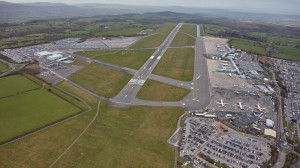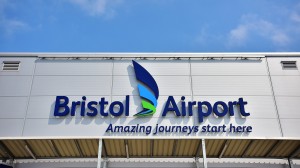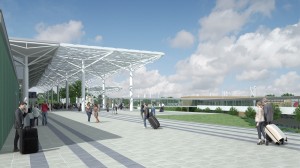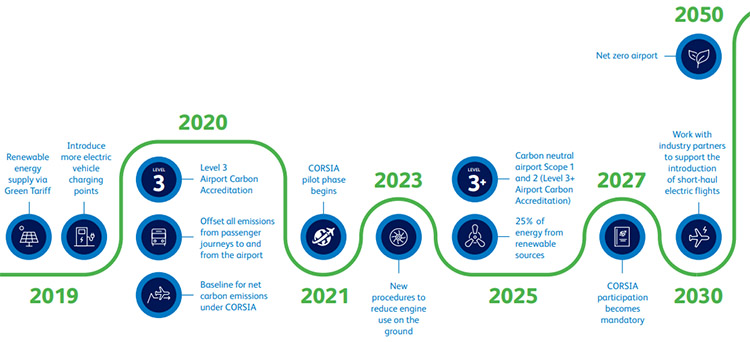Bristol Airport has become the first in Europe to offset all road journeys made by its passengers. The carbon offsetting scheme, which came into effect on New Year’s Day and covers trips to and from the airport, forms part of its ‘carbon roadmap’ published last year.
Offsets will be bought retrospectively based on an annual passenger survey showing the different modes of travel used by passengers. 
Suitable offsetting schemes will be selected in association with the environmental effects working group of the airport’s consultative committee, on which local communities and airport users are represented.
Introducing a carbon levy to offset all road journeys is one of three key challenges the airport, the fifth busiest in the UK outside London, has set itself in its carbon roadmap, pictured bottom, – the others are fast-tracking its target of becoming carbon neutral target from 2030 to 2025 and keeping emissions from all its flights at 2020 levels.
Bristol Airport head of sustainability James Shearman said: “This commitment to offset carbon emissions from surface access recognises that environmental impacts reach beyond the boundary of the airport.
“With airlines taking steps to reduce and offset carbon emissions it means many customer journeys could be carbon neutral from front door to final destination in 2020.”
In November, low-cost carrier easyJet – the airport’s largest operator accounting for more than half all its flights – vowed to become the first major airline to offset carbon emissions from fuel used by its aircraft. 
The pledge comes ahead of next year’s launch of the Carbon Offsetting Reduction Scheme for International Aviation (CORSIA) – a global agreement to stabilise net carbon emissions from flights at 2020 levels.
Last summer the airport switched to a 100% renewable electricity supply in what it described as “a significant step towards reducing its carbon footprint”.
Under the three-year agreement with Danish global renewable energy supplier Ørsted, the airport’s annual electricity use of 17m kWh is being powered entirely by renewable sources.
Electricity is the largest contributor to carbon emissions from on-site airport operations.
The airport said bringing forward its target to be carbon neutral by 2025 would make it consistent with the climate emergencies declared by Bristol City Council and the West of England Combined Authority.
The pledge came as it faced flak over its ambitious expansion plan to enable it to handle 12m passengers a year.
The scheme, pictured, is due to go before North Somerset Council’s planning committee within the next few months but has already attracted thousands of objections, including from Bath & North East Somerset Council.
However, the airport said the plans would generate an additional £1.4bn for the regional economy by the mid-2020s while more than 1,000 jobs would be created over the next decade as part of its further development.
The airport has a longer-term ambition to handle up to 20m passengers a year by the mid-2040s. Last year’s total is expected to be around the 9m mark – close to the 10m its terminal is limited to under its current planning permission.
The airport, which employs around 4,000 on its 196-hectare site, estimates it also supports just under 24,000 jobs in the wider economy of the South West and South Wales.
More than £160m has been invested by its Canadian owners Ontario Teachers’ Pension Plan since 2010 in new facilities and infrastructure to keep pace with growth in passenger numbers.
Last year research carried out for the airport showed that passengers from the South West using London airports instead of flying from Bristol were creating carbon emissions equivalent to more than 15m gallons of petrol.
According to the Air Transport Action Group, which represents the air transport industry, global aviation industry produces around 2% of all human-induced carbon dioxide (CO2) emissions.
Aviation is responsible for 12% of CO2 emissions from all transport sources, compared to 74% from road transport.
Carbon neutrality requires airports to reduce emissions in their direct control as much as possible and offset those remaining by investing in emissions reductions in other sectors.
Net zero goes further and involves greater reductions in emissions because any offsetting must remove carbon from the atmosphere through natural processes, such as afforestation, or the use of carbon capture and storage technology.
Bristol Airport currently has Level 2 Airport Carbon Accreditation under an independent, institutionally endorsed carbon management programme.































